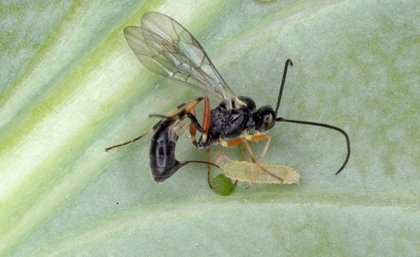1MG FlippingBooks
Natural biological control saves farmers millions in pest management
Elizabeth Gracie

Research led by the University of Queensland’s (UQ) School of Biological Sciences has identified that the natural enemies of insect pests could be used as a means of natural pest control if released in a pest’s native habitat, saving farmers billions of dollars across Asia and the Pacific in crop loss and pest control methods.
Originally published in Nature Ecology and Evolution, the research found that the careful release of an exotic natural enemy into a pest’s native habitat could work as an effective biological control and natural pest management method.
According to Dr Kris Wyckhuys from UQ’s School of Biological Sciences, the research team meticulously chose co-evolved beneficial insects that would pose a minimal ecological upset to the environment they are released in.
“We’ve reviewed how biological control introductions have effectively managed 43 insect pests in food, feed and fibre crops in the Asia-Pacific region over a century,” said Dr Wyckhuys.
The use of naturally occurring biological control has already helped regulate invasive pest threats in multiple key food crops such as banana, breadfruit and coconut in farms across Asia.
“Our work shows these techniques are saving farmers in Asia around $20.1bn to $26.8bn per year,” said Dr Wyckhuys.
“That’s a phenomenal amount of money and benefit, particularly when compared to other innovations in the agricultural sector.”
Associate Professor Micheal Furlong said that increased recognition of biological control as a feasible and sustainable means of pest management had the potential to lead to not just greater uptake, but more resilient and prosperous farming globally.
“Biological control offers great opportunities for some of the world’s poorest farmers,” said Dr Furlong.
“It’s promoted rural growth and prosperity even in marginal, poorly endowed, non-rice environments.
“These innovative approaches, with increasingly better science, are helping feed the world, safeguard on-farm biodiversity and increase farmers quality of life.”
The research team hopes that their findings will show farmers that biological pest control methods are easy, effective and a more environmentally friendly alternative to traditionally used pesticides.
“We’re hoping this research provides lessons for future efforts to mitigate invasive species, restore ecological resilience, and sustainably increase the output of our global food system,” said Dr Furlong.
NEWS

Prodoz, a Proudly Australian and family-owned agribusiness, based in Melbourne, is strengthening its positions as national/international leader in advanced crop – science solutions through a growing portfolio of global innovation partners and a distribution footprint supported by all major distributors - includes Nutrien Ag, Elders, Lindsay Rural and Independent Rural stores.

Trace minerals are required for optimal growth, reproduction, and immunity. Optimising trace mineral status relying solely on oral supplements across a herd may fail because of variation in individual intake and reduced absorption due to antagonism of other ration components and minerals. The use of injectable trace mineral supplements has been associated with positive reproductive outcomes including improved conception rate, increased odds of pregnancy and greater final in calf rate. A study conducted on 2,168 dairy cows, administered injectable trace minerals, four weeks prior to calving and again four weeks prior to the start of mating showed treated animals had a 3.3 per cent greater final in-calf rate, and a reduced time from start of mating to conception, compared to control animals 1 . The Importance of B12 Dr Carl Eden, Technical Services Veterinarian with Boehringer Ingelheim says “Vitamin B12 is sometimes referred to as a ‘super vitamin’ because it is only required in very small amounts but vital to many essential metabolic pathways. However, demand for B12 can vary considerably during the year and we see serum levels of B12 fall at critical times, such as the first few months after calving.” Vitamin B12 contains cobalt, so deficiency in cobalt can lead to deficiency in vitamin B12 because ruminants get most of their B12 as a byproduct of ruminal fermentation where the bacteria in their rumen assemble B12 from cobalt for use by the cow. Sub-optimal trace mineral and vitamin B12 status at calving, mating, and drying off has been shown to negatively impact growth, reproduction, and immunity. Using a trace mineral injectable containing vitamin B12 can improve trace mineral and vitamin B12 status at these critical times. Marks-Min with Vitamin B12 – The Evidence In the largest trace element study to date, Marks-Min Injectable Trace Mineral with Vitamin B12 demonstrated remarkable results when compared to a reference trace mineral injection. “Given the differences between Marks-Min and other products on the market, we wanted to generate a compelling data set to demonstrate how effective it was compared to the pioneer product. We entrusted this work to a third-party research company” says Dr Eden. “We chose farms that were at the top of their game from a reproductive perspective. We made sure that the farms had no evidence of trace element or vitamin B12 deficiencies or excess.” Across all outcomes of interest, Marks-Min demonstrated clear non-inferiority when compared to the reference product. Outcomes measured included submission, pregnancy and conception rates, and six week in-calf rate. Marks-Min demonstrated it is highly suited as an alternative treatment to the reference product. Reference: 1. Hawkins, D., and B. V. S. Franklin. New Zealand Dairy Veterinarians Newsletter 24 (2007): 12-16 Company website: livestockfirst.com.au Company email address: CustomerCare.Australia@boehringer-ingelheim.com Company video: https://vimeo.com/1138807630?fl=pl&fe=cm














